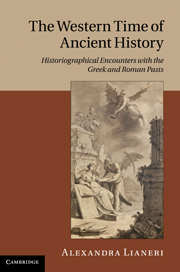Book contents
- Frontmatter
- Contents
- Acknowledgements
- Notes on contributors
- INTRODUCTION
- THEORISING WESTERN TIME: CONCEPTS AND MODELS
- ANCIENT HISTORY AND MODERN TEMPORALITIES
- UNFOUNDING TIME IN AND THROUGH ANCIENT HISTORICAL THOUGHT
- 10 Thucydides and social change: Between akribeia and universality
- 11 Historia magistra vitae in Herodotus and Thucydides? The exemplary use of the past and ancient and modern temporalities
- 12 Repetition and exemplarity in historical thought: Ancient Rome and the ghosts of modernity
- 13 Time and authority in the Chronicle of Sulpicius Severus
- AFTERWORD
- Bibliography
- Index
11 - Historia magistra vitae in Herodotus and Thucydides? The exemplary use of the past and ancient and modern temporalities
from UNFOUNDING TIME IN AND THROUGH ANCIENT HISTORICAL THOUGHT
Published online by Cambridge University Press: 03 May 2011
- Frontmatter
- Contents
- Acknowledgements
- Notes on contributors
- INTRODUCTION
- THEORISING WESTERN TIME: CONCEPTS AND MODELS
- ANCIENT HISTORY AND MODERN TEMPORALITIES
- UNFOUNDING TIME IN AND THROUGH ANCIENT HISTORICAL THOUGHT
- 10 Thucydides and social change: Between akribeia and universality
- 11 Historia magistra vitae in Herodotus and Thucydides? The exemplary use of the past and ancient and modern temporalities
- 12 Repetition and exemplarity in historical thought: Ancient Rome and the ghosts of modernity
- 13 Time and authority in the Chronicle of Sulpicius Severus
- AFTERWORD
- Bibliography
- Index
Summary
THE EXEMPLARY USE OF THE PAST IN ANTIQUITY AND THE MODERN AGE
Reinhart Koselleck starts his book Futures Past with a discussion of Albrecht Altdorfer's painting ‘Die Alexanderschlacht’. Altdorfer seems to have taken pains to be as exact as possible. His painting shows in much detail the different sections of the battlefields. On the flags, we even find inscribed the number of troops as listed by Curtius Rufus. And yet, strikingly, the Persians look more or less like the Turks who besieged Vienna when the picture was painted in 1529 ce. On the other hand, three hundred years later, Friedrich Schlegel described the painting as an expression of old knighthood, thereby distinguishing both antiquity and the sixteenth century ce from his own time:
Formulated schematically, there was for Schlegel, in the three hundred years separating him from Altdorfer, more time (or perhaps a different mode of time) than appeared to have passed for Altdorfer in the eighteen hundred years or so that lay between the Battle of Issus and his painting.
As Koselleck points out, the ‘temporalization of history’ created an awareness of the specific features of times and thereby led to an emphasis on the individuality or even autonomy of epochs. One of the consequences of this is the questioning of the topos of ‘historia magistra vitae’. While the exemplary use of the past has not completely vanished in the modern age, the uniqueness of epochs makes direct juxtapositions of different events rather problematic and if such juxtapositions want to claim some plausibility, they have to take into account and carefully weigh the cultural settings of the events that are compared with one another.
- Type
- Chapter
- Information
- The Western Time of Ancient HistoryHistoriographical Encounters with the Greek and Roman Pasts, pp. 247 - 263Publisher: Cambridge University PressPrint publication year: 2011
- 3
- Cited by



